- Home
- Andrew McGahan
Treasures of the Deep
Treasures of the Deep Read online
PRAISE FOR SHIP KINGS
‘A fitting end to the epic Ship Kings series, Treasures of the Deep moves with mysterious grandeur through lost oceans and wild. Its captains and crew, both real and ghostly, find equal parts horror and wonder in their path. These are some deep, dark, fantastical adventures. Do you dare to set sail?’
Margo Lanagan
‘These taut, thrilling and powerfully imagined stories catapulted me back into the excitement and delight of the original quartet. Perfect for long-time fans or for those new to the series, they’re a wonderful reminder of the ambition and intelligence that made McGahan such an essential writer.’
James Bradley
‘McGahan continues what is turning into an authoritative act of world-building, in prose much more chiselled than that usually found in this kind of fantasy.’
Sydney Morning Herald
‘This is a richly imagined world of creaking timbers, tall masts and muscled sailors amid the complex social order of a ship of 600 men. McGahan’s lyrical prose makes you feel the sway of hammock and hear the sea thumping against the hull.’
Australian Book Review
‘This beautifully crafted novel shapes up as a classic seafaring tale. In Dow, we have the makings of a classic hero.’
Herald Sun
‘McGahan captures the mystery and romance of the sea, and draws us in with his fine portrayal of his restless lead.’
Australian Bookseller + Publisher
‘Masterful storytelling, elegant prose and a powerful sense of place … the kind of storytelling that stays with you long after the tale has ended.’
Viewpoint
SHIP KINGS
THE COMING OF THE WHIRLPOOL
THE VOYAGE OF THE UNQUIET ICE
THE WAR OF THE FOUR ISLES
THE OCEAN OF THE DEAD
Also by Andrew McGahan
PRAISE
1988
LAST DRINKS
THE WHITE EARTH
UNDERGROUND
WONDERS OF A GODLESS EARTH
RICH MAN’S HOUSE
First published in 2020
Copyright © The Estate of Andrew McGahan, 2020
Six of these stories first appeared on shipkings.com.au.
All rights reserved. No part of this book may be reproduced or transmitted in any form or by any means, electronic or mechanical, including photocopying, recording or by any information storage and retrieval system, without prior permission in writing from the publisher. The Australian Copyright Act 1968 (the Act) allows a maximum of one chapter or ten per cent of this book, whichever is the greater, to be photocopied by any educational institution for its educational purposes provided that the educational institution (or body that administers it) has given a remuneration notice to the Copyright Agency (Australia) under the Act.
Allen & Unwin
83 Alexander Street
Crows Nest NSW 2065
Australia
Phone: (61 2) 8425 0100
Email: [email protected]
Web: www.allenandunwin.com
ISBN 978 1 76052 484 5
eISBN 978 1 76106 069 4
For teaching resources, explore www.allenandunwin.com/resources/for-teachers
Cover and text design by Liz Seymour
Cover and internal illustrations by Ritva Voutila
Set by Midland Typesetters, Australia
CONTENTS
THE NAMING OF THE CHLOE
THE BLINDING OF MOTHER GALE
THE WRECK OF THE BENT WING
PART ONE
THE WRECK OF THE BENT WING
PART TWO
THE FISH
PART ONE
THE FISH
PART TWO
THE FISH
PART THREE
THE NAMING OF THE CHLOE
Long before the young Vincente of the Shinbone laid eyes upon his future bride, he’d heard the most frightful rumours about her. Unwed well past the customary age, she was reputed to be a terror to any man who tried to court her; caustic of temper and sharp of tongue, arrogant in manner, cruel by nature, and as dangerous to all hands, everyone said, as a hundred-gun battleship.
Such, at least, were the stories repeated around the dinner table in many a Great Cabin, as rueful young officers recalled their bruising encounters with the Lady Esmeralda Chloemena Despina, Princess Royal, and only daughter of Ferdinand of the Scale, King of Castille.
Not that Vincente much heeded these tales; a Castille princess was unlikely to ever be any concern of his. For one thing, although Vincente’s background was prosperous and respectable, he was not of a noble line, and so could never expect to court royalty. And second, his own kingdom of Valignano and the Lady’s kingdom of Castille had been sworn enemies for as long as anyone could remember. They were not at outright war anymore – for this was in the peaceful days of the Sea Lord’s rule – but they were close enough to it. A Valignano suitor would find very cold welcome if he went calling in Castille.
By all likelihood, thus, Vincente and this future wife should never have even met.
How they did come to meet, and so alter not only the course of their own lives, but the whole course of history, is a story that all scholars must ponder in its strangeness and tragedy. Not least those historians who are students of the life of Dow Amber. For though there may seem little connection through the years and across the sea between the meeting of a Ship Kings officer and a princess, and a boy of New Island who was not yet born, in fact the webs of fate draw all three inexorably together.
Those webs began to be woven on the day that the young Vincente fought his first sea battle.
It was an event that would make him famous throughout the kingdoms, but in fact his name was well known in naval circles even before that day, for his early career had been a notable one. Born into a wealthy Valignano family admired for its long seafaring tradition, he had enlisted as a midshipman at age fourteen, and so able had he proved himself that by sixteen he was already a sub-lieutenant, two years in advance of the usual age, and likewise a junior lieutenant by eighteen, and a senior lieutenant by twenty-one.
His first postings were served upon frigates belonging to kingdoms other than his own, as was the custom, but it was when he was posted to his first Valignano battleship, the Momentous, that his fame truly began to spread. The Momentous was commanded by a bold and irascible old captain by the name of Umberto of the Snail, who was wont to take his ship wilfully into many perils, and who, seeing something he liked in his new lieutenant, assigned Vincente all manner of hazardous tasks.
It was Vincente, for instance, who rescued the crew of one of the ship’s boats when it was dashed to pieces by an enraged whale. The young lieutenant fearlessly plunged his own boat into the deadly tumult to snatch one of the terrified sailors from the beast’s very jaws. And it was Vincente who saved the Momentous from annihilation when a blaze below decks threatened the magazines; he fought his way through the fire to reach the gunpowder stores, and then used that same gunpowder to create a cunningly focused blast that snuffed the fire out.
And when the Momentous dared to voyage to the dreaded Unquiet Ice, the first ship to do so in some thirty years, it was Vincente who was foremost in daring among the great bergs and bitter cold. Umberto had taken them north in the hope of finding the fabled Northern Way, and though they failed in that aim, despite sailing within sight of the terrible Ice Wall, they were still feted upon their return, and it was Vincente whom the captain praised most in his official account of the arctic realm.
By the age of twenty-five, Vincente was a junior commander and Third Officer upon the Momentous; the youngest officer of such rank in the fleet. He was quite aware, however, that from this
point on his climb through the ranks would be slower, regardless of his skill or daring, for senior command positions were usually reserved for the nobility, and only in rare circumstances were offered to commoners such as himself.
Nevertheless, the years that followed were happy ones, and by dint of many brave deeds upon many long voyages, Vincente remained Valignano’s most celebrated mariner. His thirtieth birthday found him promoted at last to Second Officer on the Momentous, and so widely and highly was his seamanship regarded that he was even invited to dine with the Sea Lord, with whom he struck up what would prove to be a lifelong friendship.
But what brought Vincente to the attention of the Castille court, and so into the presence of the Lady Esmeralda, was another matter entirely: one not of seamanship but of honour.
For Vincente’s captain, Umberto of the Snail, bilious and short-tempered as he was, became embroiled in a heated feud with another old captain, equally bilious and short-tempered, one Ramon of the Stirrup, captain of a Castille battleship, the Vanquish. The two men had served as cadets together and had hated each ever since – but their latest argument involved a collision between their ships during fleet manoeuvres upon the Golden Millpond. Little damage was done to either vessel, but grievous injury was inflicted upon the pride of the two captains. Umberto blamed Ramon for the mishap, and Ramon blamed Umberto, and neither would be gainsaid.
The matter escalated to yet another diplomatic crisis between Valignano and Castille, for as it happened Umberto was cousin to Benefice, King of Valignano, and Ramon was likewise cousin to Ferdinand, King of Castille – and each sovereign loyally came out in support of their relative. Royal honour was at stake, and after some years of threatening letters and withdrawals of ambassadors and presentations to the Lords of the Fleet and appeals to the Sea Lord, it was decided that the affair could only be settled on the field of combat. A duel was arranged between the captains, to the death or surrender – whichever came first – battleship to battleship upon the open sea.
The two ships met on a grey winter’s day off the western shores, each with a single frigate standing by to take off survivors, should it come to that, though sinking in such duels was rare; the aim was to capture the opposing ship, not send it to the bottom.
And because it was not thought fair to force common seamen to risk life and limb in what was essentially a private argument between their captains, each vessel was crewed for this day by volunteers only. But there’d been no trouble in filling the rosters; on the contrary, many had been turned away, for there was no greater distinction – in those peaceful times between the Great Wars – than to have fought in and survived a true battle.
The signal was given, the cannons roared and the duel began. Both combatants were hundred gunners, and so the encounter was evenly matched, each ship blazing away at the other with swarms of grapeshot.
Vincente, as Second Officer on the Momentous, was posted below, in charge of the gun decks, and so should have played only a minor role in the battle overall. But as fate would have it, perhaps a quarter-hour into the furious exchange, the ship’s First Officer was severely wounded by flying shrapnel, and so Vincente was summoned to the high deck to assume the injured man’s duties. He arrived, however, only in time to see Captain Umberto himself fall dead in a hail of shot, leaving a surprised Vincente in outright command of the ship.
He might have surrendered right then with honour, as the feud itself had died with Umberto. But by now – gore-stained and powder-blackened and appalled at any thought of defeat – Vincente’s blood was truly up. ‘Come about,’ he cried, ‘and keep firing!’
Meanwhile, on the Vanquish, Captain Ramon – as ever in step with his old enemy Umberto – had also just been killed by flying shot, and likewise command of his ship had fallen to another. That person was not, however, the First Officer, as would be expected. Rather, it was a man who should never have been on the Vanquish at all; Crown Prince Carlos of the Scale, only son of King Ferdinand, and heir to the throne of Castille.
His father, of course, would never have allowed the Prince to risk his life in such a reckless fashion. But Carlos was a grown man and a fully trained commander in his own right, and brave to boot – if not, to his guileful father’s disappointment, all that subtle – and he chafed at the protected life of the royal court. Thus he’d convinced his older cousin Ramon to let him come aboard for the duel, so that he could taste battle for real.
Finding himself suddenly in command, Prince Carlos fought on courageously, but he was outsailed and outgunned at every turn by Vincente, and all too soon the Vanquish lost its two forward masts and control of its rudder. Victory belonged to the Momentous, closed in now to only fifty yards. But just as the Vanquish was running the white flag up its single remaining mast, this mast too collapsed, and as it toppled over the side and plunged into the depths, it dragged three hapless seamen with it, tangled in a great net of rope and canvas.
The Prince, watching on – without a moment’s thought for his own safety – dove in after them.
Vincente, nearby on the high deck of the Momentous, witnessed the dive. He didn’t know then who the officer was, but was so impressed by the selflessness of the act that when the man did not resurface (for Carlos, in his efforts to free the drowning seamen, had himself become entangled) Vincente too, with no concern for his own life, plucked up a knife and leapt from the rail.
The result of all his heroism? Carlos, the three seamen and Vincente all made it back to the surface alive, to the cheers of the crews on both ships, who had by then put all thought of feuding behind them.
Vincente’s fame was thus assured. He had won the battle and captured the Vanquish – which by law passed as a prize to the Valignano fleet – and what was more, he had singlehandedly saved the life of the Crown Prince of Castille. Carlos’ father King Ferdinand was so grateful (once he’d overcome his rage at the stupidity of his son) that he put aside the animosity between the two kingdoms and invited Vincente to a special reception at the Castille royal court in Coris, there to be officially thanked by Ferdinand himself for the chivalrous rescue.
It was a gesture of goodwill that the king was to sorely regret, for it was at this reception that Vincente met Ferdinand’s daughter, the Lady Esmerelda.
The Lady Esmeralda, for her part, expected little but boredom from the reception. She might not have gone at all, for she disliked such affairs, with their pomp and tedium, but Carlos was her brother, so it would hardly be fitting to miss the honouring of the man who had saved his life. And anyway, Faustus had advised that she should go.
Faustus was her scapegoat.
Now, it was quite unheard of that a person – as compared to a ship – should have their own scapegoat, but the Lady Esmerelda did. It was her father’s doing, for her mother had died giving birth to her, and the Lady Esmeralda herself was frail and sickly in her early years – and such was King Ferdinand’s terror that he would lose his daughter he took the extraordinary step of appointing a scapegoat to watch over her.
It was a contentious posting, and many scapegoats would’ve refused it. To serve a mere child – even if a princess – rather than upon a noble vessel voyaging across the sea, why, it was improper and demeaning. But Faustus accepted the position willingly.
He was a strange man; secretive in manner and cold seemingly in spirit. He came from a long line of mariners, but had defied family tradition and never gone to sea, seeking instead employment as an administrator in the royal court, where he laboured in dark rooms over dark papers, wielding much power, but seldom seeing the sun or the ocean. In truth, Faustus hated sailing, and for a hidden reason; he suffered – to his deathly embarrassment – from a violent and incurable seasickness.
Nevertheless, one of his many duties was to inspect the accounts of each of the king’s ships, and so he must from time to time board this vessel or that in the harbour. On one such occasion – it was the very day the Lady Esmerelda was born – as he was stepping from a boat onto a boar
ding ladder, he was bitten by a sea snake.
A sea snake! This was a rare event, and portentous, for the venom of the sea snake was so deadly as to be almost always fatal, but those who survived were considered specially marked to be scapegoats.
And Faustus did survive, though barely, and only after long agony and the loss of the afflicted leg. It was a year before he could even walk again, limping on his wooden stump. By then he was shrunken, old before his time, and bitter. He had lost his position at court and the power that went with it, and all that awaited him now was to serve as a scapegoat upon the hated sea.
So when instead he was chosen – snake-bitten on the day of her birth – to play scapegoat to the Lady Esmeralda, he took up the unusual commission eagerly. Not only did it mean he could return to court and wield influence there once again, it also meant he would not have to go to sea; a princess would rarely go sailing.
Such ignoble motives in a scapegoat did not bode well, perhaps. But at first it appeared that Faustus did indeed bring good fortune to the Lady Esmerelda, for under his care she at last threw off sickness and began to thrive. So grateful was the king he rewarded the scapegoat with money and high office, and even took to consulting him at times on matters of state.
Faustus found himself powerful once more, and was pleased. But the bite of the snake had affected him in strange ways, blessing – or cursing – him with some measure of foresight. And a warning sounded deep in his cold heart that a day would come when the princess would no longer need his protection, and that such a day would spell doom for him. And so he watched over her greedily, to prevent the coming of that day.
But the Lady Esmerelda guessed none of this. She loved her scapegoat as a second father, despite his stern and distant manner, and always heeded his advice. The years passed, and she grew to be a young woman of slight and small stature, but otherwise hale and healthy; the favourite, King Ferdinand found to his own surprise, of his two children, for she was far more intelligent and shrewd than her brother, and fiercer too, for all that she was destined for a woman’s role in life.

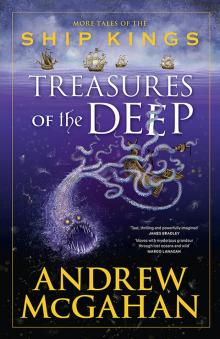 Treasures of the Deep
Treasures of the Deep The Rich Man’s House
The Rich Man’s House Praise
Praise The White Earth
The White Earth 1988
1988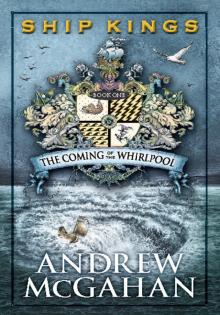 The Coming of the Whirlpool
The Coming of the Whirlpool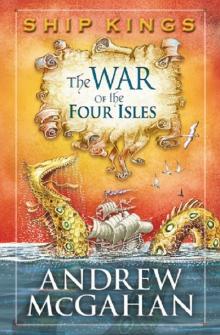 The War of the Four Isles
The War of the Four Isles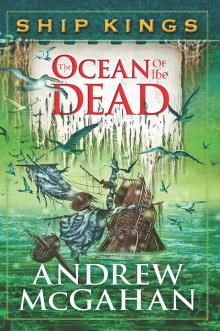 The Ocean of the Dead: Ship Kings 4
The Ocean of the Dead: Ship Kings 4 Last Drinks
Last Drinks Wonders of a Godless World
Wonders of a Godless World Underground
Underground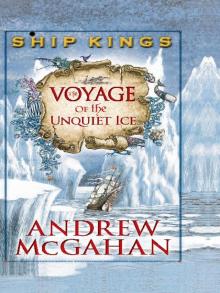 The Voyage of the Unquiet Ice
The Voyage of the Unquiet Ice